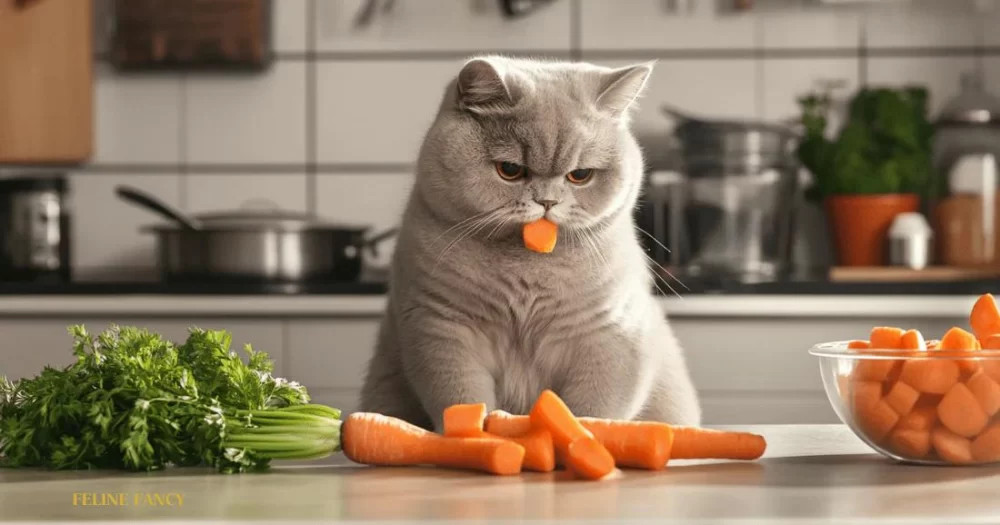Can Cats Eat Carrots Raw?
If you’re a cat owner, you’ve probably wondered if it’s okay to share your snacks with your feline friend. After all, carrots are a common, healthy vegetable for humans, but can cats eat them raw? As a cat lover myself, I wanted to ensure that any treats I gave my cats were safe and nutritious. When I first thought about feeding raw carrots to my cats, I wasn’t sure if they would even enjoy them, let alone if they were healthy or safe. But after looking into it more, I discovered some interesting facts that may surprise you!
While cats are obligate carnivores, meaning they primarily thrive on meat-based diets, many cat owners are keen to introduce vegetables into their pets’ meals for additional nutrients or as a treat. Carrots, in particular, are often a topic of discussion. In this article, I’ll explore whether raw carrots are safe for cats, what benefits they offer, and how you can incorporate them into your cat's diet without causing harm.
Are Raw Carrots Safe for Cats?
Raw carrots are generally safe for cats in moderation. They are not toxic, and most cats can digest them without issue. However, since cats are obligate carnivores, their digestive systems aren’t designed to process plant-based foods as efficiently as they process meat. This means that while your cat may nibble on a raw carrot, they may not get much nutritional benefit from it in comparison to a protein-rich food source.
That being said, carrots can still be a fun and healthy snack for your cat. The key is moderation and proper preparation. When I first offered carrots to my cat, Bella, she was a little confused but curious. I started with small, bite-sized pieces of raw carrot, which made it easy for her to chew. As I watched her cautiously nibble on the pieces, I realized that she enjoyed the crunchy texture, which can be a great way to keep her engaged during treat time.
Benefits of Feeding Raw Carrots to Cats
Carrots offer several health benefits that may be appealing to your cat, even though they aren’t a necessary part of a feline diet. Here are some of the benefits I found when introducing carrots to my cats:
1. Low in Calories
Carrots are low in calories and high in water content, making them a great option for cats that need to maintain a healthy weight. If you’re looking to add variety to your cat’s diet without adding extra calories, raw carrots are a good choice. I’ve used carrots as an occasional snack for Bella to help her satisfy her cravings without overfeeding her, and it’s worked well to maintain her ideal weight.
2. Good Source of Vitamin A
Carrots are packed with beta-carotene, which the body converts into vitamin A. This vitamin is crucial for maintaining healthy vision, skin, and immune function. While cats do produce their own vitamin A from animal-based proteins, a little extra boost of this vitamin from carrots can be a good addition to their diet. However, you should not rely solely on carrots to meet your cat’s vitamin A needs, as a well-balanced diet is essential for overall health.
3. Promotes Dental Health
Chewing on crunchy vegetables like carrots can help clean your cat’s teeth by scraping away plaque buildup. Although raw carrots are not a substitute for regular dental care, they can act as an occasional treat that helps promote oral hygiene. Bella particularly enjoys the crunchiness, and I noticed that her breath seemed fresher after she chewed on carrot pieces. It’s a fun way to encourage dental health while offering a healthy snack!
How to Safely Feed Raw Carrots to Your Cat
Feeding raw carrots to your cat is relatively simple, but it’s important to follow a few safety guidelines to ensure that your pet has a positive experience:
1. Cut the Carrots into Small, Bite-Sized Pieces
Since cats have smaller mouths than humans, it’s crucial to cut the carrots into manageable pieces. Large chunks of raw carrot can pose a choking hazard, especially if your cat tries to swallow them whole. I always make sure to cut the carrot into small, bite-sized pieces that Bella can easily nibble on without risk. This helps prevent choking and allows your cat to enjoy the treat safely.
2. Introduce Carrots Gradually
Whenever you’re introducing a new food to your cat, it’s important to start with small amounts. Begin by offering just a few tiny pieces of carrot and monitor how your cat reacts. If they seem to enjoy it and show no signs of digestive distress, you can continue offering small servings as an occasional treat. For Bella, she quickly took to carrots, but some cats may need time to adjust to the new taste and texture.
3. Watch for Digestive Issues
Some cats may have difficulty digesting raw vegetables, and you may notice signs of stomach upset such as vomiting, diarrhea, or bloating. If this happens, discontinue feeding carrots and consult your veterinarian. In Bella’s case, she had no issues with digestion, and I was able to continue giving her carrots as a special treat. However, always monitor your cat after introducing a new food to ensure they are handling it well.
4. Offer Carrots in Moderation
Carrots should never make up a significant portion of your cat’s diet. While they are safe in small amounts, too much vegetable matter can upset your cat’s digestive system or interfere with the balance of their primary diet. I’ve used carrots as an occasional treat, no more than once or twice a week. This ensures that Bella enjoys the benefits of carrots without compromising her nutrition.
Alternatives to Raw Carrots for Cats
While raw carrots are generally safe for cats, not all vegetables are suitable for feline consumption. If your cat doesn’t take to carrots or you’re looking for other healthy options, consider the following alternatives:
- Cooked Carrots: Some cats prefer cooked carrots, as the softer texture may be easier to eat. Simply steam or boil the carrots without adding any seasoning, and cut them into small pieces.
- Cooked Pumpkin: Pumpkin is another cat-friendly vegetable that offers digestive benefits and is rich in fiber. It’s often used to help regulate bowel movements.
- Spinach: Spinach is a low-calorie leafy green that can be fed to cats in small amounts. It contains iron and fiber, but it should be offered sparingly, as too much can cause kidney issues in some cats.
Conclusion: Can Cats Eat Carrots Raw?
In conclusion, raw carrots are generally safe for cats to eat in moderation, offering benefits such as improved dental health, a boost of vitamin A, and a low-calorie treat option. However, they should be introduced gradually, prepared correctly, and given in small, manageable pieces to prevent choking hazards. As always, it’s important to monitor your cat’s response to new foods and consult with your veterinarian if you have concerns about introducing raw vegetables into their diet. By following these guidelines, you can safely share the health benefits of carrots with your furry friend!












